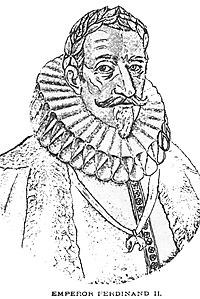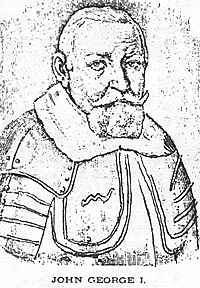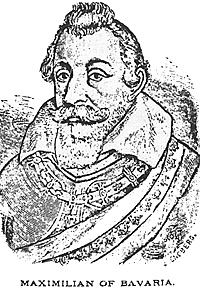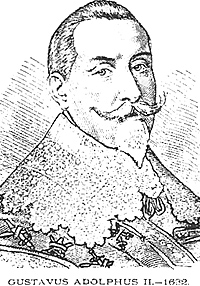 EMPEROR FERDINAND II
EMPEROR FERDINAND II
Emperor of Austria. His attempt to bring Germany under Hapsburg rule by using a dispute over succession in Germany resulted in the Thirty Years War. Author of the "Edict of Restitution", one of the greatest propaganda boomerangs of all time. It promised the forceful restoration of the Catholic faith and the destruction of Protestantism. It failed in its primary goal to enlist Catholic support for the Catholic Princes of Germany saw through it to the Hapsburg power grab which it was meant to mask. Worse still many of the Protestant princes took it literally as a challenge to their very existence and after the unfortunate massacre of Magdeburg many Protestants felt that the Emperor's objective was nothing less than genocide. 6
CHRISTIAN IV of Denmark
Leader of a 25,000 man Protestant
invasion of Germany in 1626. Although he
pretended to be a Protestant liberator, the truth of
his territorial ambition was too obvious and
spoiled future chances for Gustavus Adolphus to
gain German Protestant allies. The sudden
collaspse of his campaign left his German allies
in despair and caused them to be suspicious of
future alliances when Gustavus Adolphus arrived
on the scene.
 JOHN GEORGE I
JOHN GEORGE I
Elector of Saxony. The Mussolini of the 30 years war. A blustering pompous ass with an inflated image of himself. Continuously meddling in affairs of both sides while professing neutrality. His vacillating prevented Gustavus Adolphus from relieving Magdeburg, and resulted in the massacre there. Finally he allied with Gustavus when it became obvious that the Imperialists had lost patience with him first, and had no intention of respecting his neutrality.
He and his army bolted on the first Imperialist charge at Breitenfeld and left his ally, the Swedish, in dire straights. Later his meddling helped spoil one of the few real chances of peace. In an era when political assassination was common it is one of history's misfortunes that John George escaped.
AXEL OXENSTIERN
Chancellor of Sweden. Undoubtably one
of the most competent chancellors any nation
ever had. His brilliant diplomacy insured Sweden
peace on her frontiers while Gustavus was in
Germany, during which time he ran Sweden in
Gustavus's absence. After Breitenfeld he almost
secured the peace and ended the war, but even
his brilliance was no match for the inspired
stupidity of John George and Maximilian of
Bavaria. After Gustavus's death he acted as
regent and successfully secured peace and
prosperity for Sweden.
 MAXIMILIAN OF BAVARIA
MAXIMILIAN OF BAVARIA
Ablest of the Catholic Princes in Germany. He welcomed the idea of the destruction of Protestantism in Germany, but feared a Hapsburg dominion. The later caused him to remain neutral and finally ally with France while his belief that the former was still possible (which it was not) caused him to destroy the one hope for peace.
The fruits of this policy of trying to have your cake and eat it too was a continuation of the war in Germany beyond the point at which there could be any German winner. As a result of this, Germany, which had been a Prosperous trading area before the war, was reduced to a wasteland and the unification of Germany was set back almost 300 years.
POPE URBAN VIII
When Ferdinand II asked for aid after the defeat at Breitenfeld, he refused. He further stated that this was not the Church's war but a Hapsburg war of aggression. He thus recognized for the first time the Protestant's right to exist and ended an era of centuries, dating back to the Crusades, in Which the Church. had actively intrigued and sanctified all nature of war and barbarism for a share of the plunder.
JEAN ARMAND DU PLESSIS
Cardinal and Duke of Richelieu Architect of French foreign policy during the period. He saw in Ferdinand it's grab for Germany the potential of the emergence of a Continental power to rival France. He persuaded Louis XIII of Catholic France to support Gustavus Adolphus to the tune of $120,000 initially and $400,000 a year for each year he maintained an army in Germany for up to six years.
TILLY
Early Imperialist Commander. In his 70s at the time of the Battle of Breienfeld, he had learned the art of war from Parma in his earlier days, and had done nothing to improve or modify it. A competent practitioner of the art, but definitely not an innovator. He was over-cautious and frequently appears to have been more worried about his reputation than about achieving any military objective. He is noteworthy mainly for his courage and integrity. He was mortally wounded at the crossing of the Lech.
ALBERT VON WALLENSTEIN
Later commander of the Imperialists. A true Machiavellian character. A mercenary commander whose genius lay not so much in battle, but in recruiting large armies of mercenaries and maintaining them at small expense to his employer. His primary strategy was to locate enough loot to keep his troops loyal to him.
He was able to negotiate with Ferdinand II as an equal and make most imprudent demands of the Hapsburg ruler, for the mercenary army was loyal to whoever gave it loot, and this was Wallenstein's specialty. He was eventually assassinated by his own men on orders from Ferdinand.
 GUSTAVUS ADLOPHUS II
GUSTAVUS ADLOPHUS II
The Lion of the North - King of Sweden. Occasionally in the vast expanse of history a figure comes forth who at first appears to be out of step with the times, but on further analysis it is seen that the times are behind him. Such a man was Gustavus Adolphus.
In an age when the absolute right of kings was still being upheld, he continued the work of his grandfather, Gustavus I, in reducing the power of the nobles, and increasing that of the council of estates. The government of Sweden was brought to approach what in later times would be called a Parliamentary Democracy. At a time when military justice depended on the whim of each -mercenary captain, he issued the first codified military laws. Further, these laws provided for trial, and appeals. While the rest of the world depended on hired mercenary soldiers who relied on looting for their income, he introduced the first modern national army based on universal conscription and relying on regular pay, and a commissary service rather than looting.
The Battle Of Breitenfeld
Back to Campaign # 72 Table of Contents
Back to Campaign List of Issues
Back to MagWeb Master Magazine List
© Copyright 1976 by Donald S. Lowry
This article appears in MagWeb (Magazine Web) on the Internet World Wide Web. Other military history articles and related product articles are available at http://www.magweb.com